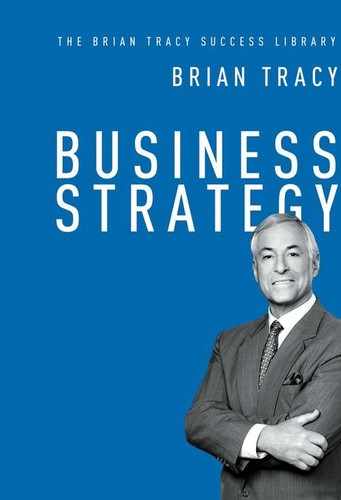Concentrate on What You Do Well
In discussing military strategy, we talked about the principle of the mass—that is, the ability of the general to bring all of his forces to concentrate in a single place at a single time to achieve victory, often against overwhelming odds. You can do the same.
Bill Gates Jr., Warren Buffett, and Bill Gates Sr. were at a dinner party. While they were chatting, one of the guests came up to them and asked this question: “You gentlemen are some of the most successful people in the world. What would you say is the most important quality for success today?”
The three men broke off their conversation, turned to the dinner party guest, and replied, simultaneously, “Focus!”
All three agreed that the ability to focus single-mindedly on one thing at a time was absolutely essential to success in a world of ceaseless activity and turbulence, constant and never-ending distractions, and so many demands for the attention of each person. Focus is the key.
The 80/20 Rule Revisited
When we talk about concentration of power or focus, we think again about the 80/20 rule. This rule says that 20 percent of the things you do will account for 80 percent of your results. This rule, which goes back to Vilfredo Pareto in 1895 and is now called the “Pareto principle,” was true then and it is true now.
Because you cannot do everything, you need to concentrate on those few things that you can do well and that represent the greatest potential for business and financial results. All business strategy revolves around massing your powers. You need to focus and leverage your strengths to achieve maximum advantage in the marketplace.
Profit from the Core
In Chris Zook and James Allen’s excellent book, Profit from the Core, the authors show that successful companies are those that dominate a core market that is highly profitable and then expand carefully into only those nearby markets where they already have a high level of knowledge and experience.
Their point is that the 80/20 rule seems to apply. Eighty percent of your profits come from the 20 percent of products or services that you offer in an excellent fashion, while 80 percent of your business activities will account for only 20 percent of your profits. You must always be studying your business and asking yourself, “What are the 20 percent of my activities that account for 80 percent of the value of all of my activities?”
What are your most profitable products and services? What are they today? What could they be tomorrow? Who are your most important and valuable customers today? Who could be your best customers tomorrow, and how could you attract and keep more of them?
One of the biggest weaknesses that we have in business today is the tendency to “scatter our forces.” As Jack Trout said in The Power of Simplicity, “One of our biggest business problems is that we offer too many products and services at too many different price points, to too many different customers in too many different markets.”
When Steve Jobs returned to Apple in 1996, the company was producing 104 different products and was in serious financial trouble. The company had only enough cash to last for another ninety days. One of the first things that Jobs did was announce that Apple was discontinuing 100 of those 104 products, as quickly as possible. By doing so, he freed up financial resources and personnel (engineers and developers) to focus on the “next big thing,” which turned out to be the iPod.
The rest is history. Within a few years, Apple was the most valuable company in the world.
Focus and concentration on your greatest opportunities and areas of highest profit potential have always been the keys to financial success in business.
New research from Northwestern University’s Kellogg School of Management shows that focusing on one thing that you do well—supported by what the researchers call “distinctive capabilities”—is the new path to competitive advantage.
In the old days, the leading companies were conglomerates with a simple “get big and get powerful” strategy: They piled up assets and used their size and reach to build unbeatable economies of scale. Then they’d go find short-term growth and profitability wherever they could find within their huge operations.
Conglomerate power is not the strategy of today’s best companies. “They do not follow the traditional portfolio strategies of seeking short-term profitability or growth wherever they can find it,” the Kellogg researchers wrote in the August 2014 edition of Strategy + Business magazine. “Rather, they recognize that value is created by their distinctive capabilities: what they can do consistently well.”
Amazon does three things well: world-class information technology, distribution of products, and an automated customer recommendation system. Those capabilities are the pillars on which the Amazon empire was built.
Apple also does just three things well: insight into what consumers want, consumer-friendly designs, and technological integration. Technological integration means the ability to get products to work together—so your iPhone can connect to your computer, for example. Those three things were all that was needed for Apple to revolutionize how we use our phones and how we listen to music.
Where should you be concentrating your time, money, and resources today to succeed greatly in today’s market? Whatever your answer, don’t delay. Do it now. As Winston Churchill said, “If you do not act when you have a chance of victory, soon you will have to act when you have no chance at all.”
